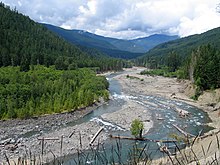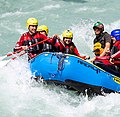Portal:Rivers
| Portal | WikiProject Rivers | Talk page |
Introduction

A river is a natural flowing watercourse, usually a freshwater stream, flowing on the Earth's land surface or inside caves towards another waterbody at a lower elevation, such as an ocean, sea, bay, lake, wetland, or another river. In some cases, a river flows into the ground or becomes dry at the end of its course without reaching another body of water. Small rivers can be referred to by names such as creek, brook, and rivulet. There are no official definitions for these various generic terms for a watercourse as applied to geographic features, although in some countries or communities, a stream is customarily referred to by one of these names as determined by its size. Many names for small rivers are specific to geographic location; examples are "run" in some parts of the United States, "burn" in Scotland and Northeast England, and "beck" in Northern England. Sometimes a river is defined as being larger than a creek, but not always; the language is vague.
Rivers are an important part of the water cycle. Water from a drainage basin generally collects into a river through surface runoff from precipitation, meltwater released from natural ice and snowpacks, and other underground sources such as groundwater recharge and springs. Rivers are often considered major features within a landscape; however, they actually only cover around 0.1% of the land on Earth. Rivers are also an important natural terraformer, as the erosive action of running water carves out rills, gullies, and valleys in the surface as well as transferring silt and dissolved minerals downstream, forming river deltas and islands where the flow slows down. As a waterbody, rivers also serve crucial ecological functions by providing and feeding freshwater habitats for aquatic and semiaquatic fauna and flora, especially for migratory fish species, as well as enabling terrestrial ecosystems to thrive in the riparian zones.
Rivers are significant to humankind since many human settlements and civilizations are built around sizeable rivers and streams. Most of the major cities of the world are situated on the banks of rivers, as they are (or were) depended upon as a vital source of drinking water, for food supply via fishing and agricultural irrigation, for shipping, as natural borders and/or defensive terrains, as a source of hydropower to drive machinery or generate electricity, for bathing, and as a means of disposing of waste. In the pre-industrial era, larger rivers were a major obstacle to the movement of people, goods, and armies across regions. Towns often developed at the few locations suitable for fording, building bridges, or supporting ports; many major cities, such as London, are located at the narrowest and most reliable sites at which a river could be crossed via bridges or ferries. (Full article...)
Selected article -
Messers Run is a tributary of Catawissa Creek in Schuylkill County, Pennsylvania, in the United States. It is approximately 5.2 miles (8.4 km) long and flows through Kline Township and East Union Township. The only named tributary of the stream is Negro Hollow, but it has two unnamed tributaries. The creek has some alkalinity, but is slightly acidic. The main rock formations in the watershed of it are the Mauch Chunk Formation and the Pottsville Formation. The main soils in the watershed are the Leck Kill soil and the Hazleton soil.
The watershed of Messers Run has an area of 5.98 square miles (15.5 km2). There are two reservoirs on the stream. It is difficult to access the stream as most of it is several hundred meters from any road. The creek is a High-Quality Coldwater Fishery and Class A Wild Trout Waters in some places. There are many species of fish inhabiting the creek, including brook, brown trout, and others. The creek has been surveyed by the Pennsylvania Fish and Boat Commission. (Full article...)Selected Quote
Selected picture

The Skjálfandafljót at Route 1 in northern Iceland. In the background is the waterfall of Goðafoss
General images -
Did you know?
- ... that the Kettle Creek (pictured) watershed contains eight percent of the Class A Wild Trout Streams in Pennsylvania?
- ... that water from the Little Applegate River was used in the mine in Sterlingville, the largest hydraulic mine in Oregon and possibly the entire western United States?
- ... that there are at least 35 sources of acid mine drainage in the Mahanoy Creek watershed?
Related portals
Selected Panorama
Topics
Subcategories
Quality content
| This is a list of recognized content, updated weekly by JL-Bot (talk · contribs) (typically on Saturdays). There is no need to edit the list yourself. If an article is missing from the list, make sure it is tagged (e.g. {{WikiProject Rivers}}) or categorized correctly and wait for the next update. See WP:RECOG for configuration options. |
Featured articles
 Aliso Creek (Orange County)
Aliso Creek (Orange County) Balch Creek
Balch Creek Big Butte Creek
Big Butte Creek Bull Run River (Oregon)
Bull Run River (Oregon) Chetco River
Chetco River Colorado River
Colorado River Columbia River
Columbia River Columbia Slough
Columbia Slough Fanno Creek
Fanno Creek Johnson Creek (Willamette River tributary)
Johnson Creek (Willamette River tributary) Jordan River (Utah)
Jordan River (Utah) Little Butte Creek
Little Butte Creek Plunketts Creek (Loyalsock Creek tributary)
Plunketts Creek (Loyalsock Creek tributary) River Parrett
River Parrett Rogue River (Oregon)
Rogue River (Oregon) St. Johns River
St. Johns River Tryon Creek
Tryon Creek Waterfalls in Ricketts Glen State Park
Waterfalls in Ricketts Glen State Park White Deer Hole Creek
White Deer Hole Creek Willamette River
Willamette River
Featured lists
 List of longest rivers of the United States (by main stem)
List of longest rivers of the United States (by main stem) List of longest streams of Idaho
List of longest streams of Idaho List of longest streams of Oregon
List of longest streams of Oregon List of tributaries of Bowman Creek
List of tributaries of Bowman Creek List of tributaries of Catawissa Creek
List of tributaries of Catawissa Creek List of tributaries of Larrys Creek
List of tributaries of Larrys Creek List of tributaries of Mahanoy Creek
List of tributaries of Mahanoy Creek List of tributaries of Shamokin Creek
List of tributaries of Shamokin Creek
Good articles
 1886 St. Croix River log jam
1886 St. Croix River log jam Abrahams Creek
Abrahams Creek Adams River (British Columbia)
Adams River (British Columbia) River Avon, Bristol
River Avon, Bristol Big Wapwallopen Creek
Big Wapwallopen Creek Black Creek (Susquehanna River tributary)
Black Creek (Susquehanna River tributary) Briar Creek (Susquehanna River tributary)
Briar Creek (Susquehanna River tributary) Brunswick Falls
Brunswick Falls Buffalo Creek (West Branch Susquehanna River tributary)
Buffalo Creek (West Branch Susquehanna River tributary) Canajoharie Creek
Canajoharie Creek Catawissa Creek
Catawissa Creek Celilo Falls
Celilo Falls Cem (river)
Cem (river) Chollas Creek
Chollas Creek Cibolo Creek
Cibolo Creek Covering of the Senne
Covering of the Senne Darby Creek (Pennsylvania)
Darby Creek (Pennsylvania) Eddy Creek (Lackawanna River tributary)
Eddy Creek (Lackawanna River tributary) Esopus Creek
Esopus Creek Estuaries of Texas
Estuaries of Texas Everglades
Everglades Fishing Creek (North Branch Susquehanna River tributary)
Fishing Creek (North Branch Susquehanna River tributary) Flushing River
Flushing River Fonteyn Kill
Fonteyn Kill Fossil Creek
Fossil Creek River Frome, Bristol
River Frome, Bristol Gowanus Canal
Gowanus Canal Great Zab
Great Zab Hammersley Fork
Hammersley Fork Harveys Creek
Harveys Creek Hudson River
Hudson River Hull Creek (Lackawanna River tributary)
Hull Creek (Lackawanna River tributary) River Hull
River Hull Hunlock Creek
Hunlock Creek River Irwell
River Irwell Islais Creek
Islais Creek Ithan Creek
Ithan Creek Jiloca (river)
Jiloca (river) Kaweah River
Kaweah River Kettle Creek (Pennsylvania)
Kettle Creek (Pennsylvania) Keyser Creek
Keyser Creek Kings River (California)
Kings River (California) Kissena Creek
Kissena Creek Klamath River
Klamath River Kootenay River
Kootenay River Laguna Canyon
Laguna Canyon Leggetts Creek
Leggetts Creek Little Applegate River
Little Applegate River Little Catawissa Creek
Little Catawissa Creek Little Fishing Creek
Little Fishing Creek Little Wapwallopen Creek
Little Wapwallopen Creek Mahanoy Creek
Mahanoy Creek Mahoning Creek (Susquehanna River tributary)
Mahoning Creek (Susquehanna River tributary) Meadow Brook (Lackawanna River tributary)
Meadow Brook (Lackawanna River tributary) Merced River
Merced River Messers Run
Messers Run Minetta Creek
Minetta Creek Minnehaha Park (Minneapolis)
Minnehaha Park (Minneapolis) Missouri River
Missouri River Moston Brook
Moston Brook Mud Creek (Chillisquaque Creek tributary)
Mud Creek (Chillisquaque Creek tributary) Muncy Creek
Muncy Creek Nanticoke Creek
Nanticoke Creek Neepaulakating Creek
Neepaulakating Creek Nescopeck Creek
Nescopeck Creek Ombla
Ombla Petitcodiac River
Petitcodiac River Potlatch River
Potlatch River River Arun
River Arun River Brue
River Brue River Tone
River Tone River Torrens
River Torrens River Weaver
River Weaver Roaring Brook (Lackawanna River tributary)
Roaring Brook (Lackawanna River tributary) Roaring Creek (Pennsylvania)
Roaring Creek (Pennsylvania) River Rother, East Sussex
River Rother, East Sussex River Rother, West Sussex
River Rother, West Sussex San Juan Creek
San Juan Creek Santa Ana River
Santa Ana River Sava
Sava Saw Mill River
Saw Mill River Scotch Run (Catawissa Creek tributary)
Scotch Run (Catawissa Creek tributary) Severn bore
Severn bore Shickshinny Creek
Shickshinny Creek Shimna River
Shimna River Shinano River
Shinano River Snake River
Snake River Solomon Creek
Solomon Creek Spring Brook (Lackawanna River tributary)
Spring Brook (Lackawanna River tributary) Stafford Meadow Brook
Stafford Meadow Brook Stanislaus River
Stanislaus River Stikine River
Stikine River Stony Brook (Charles River tributary, Boston)
Stony Brook (Charles River tributary, Boston) Sulphur Creek (California)
Sulphur Creek (California) Tangascootack Creek
Tangascootack Creek Toby Creek
Toby Creek Trinity River (California)
Trinity River (California) River Trym
River Trym Twomile Run
Twomile Run Wainui Falls
Wainui Falls River Welland
River Welland West Branch Fishing Creek
West Branch Fishing Creek West Creek (Pennsylvania)
West Creek (Pennsylvania) West Kill
West Kill River Witham
River Witham Yellala Falls
Yellala Falls Zarqa River
Zarqa River
Things to do

- Join WikiProject Rivers
- Help select future pictures and articles.
- Add items to Did You Know?
- Add the portal link to the top of the See Also section of all relevant pages. This can be done by adding
{{Portal|Rivers}}immediately under the section header.
Associated Wikimedia
The following Wikimedia Foundation sister projects provide more on this subject:
-
Commons
Free media repository -
Wikibooks
Free textbooks and manuals -
Wikidata
Free knowledge base -
Wikinews
Free-content news -
Wikiquote
Collection of quotations -
Wikisource
Free-content library -
Wikiversity
Free learning tools -
Wikivoyage
Free travel guide -
Wiktionary
Dictionary and thesaurus




















































